Intro: Alan Dearling
Alan Dearling spent his first year at the University of Kent (UKC), way back in 1969, sharing a room in ‘digs’ with Martin Slade. It was in a bungalow about half an hour walk from the university campus, traversed along a dark, hilly, country road in the village of Tyler Hill. One local pub, which had a friendly sign up in the door, refusing service to university students!
Martin and myself were two very unlikely bed-room dwellers. I was a scruffy, Afghan-coated, would-be ‘hippy’ intellectual. Martin was polo-jumpers and a natural-born ‘boffin’.
Alan dimly remembers that year with mixed emotions, saying,
“I was younger than Martin – Martin was a Science student: chemistry – I was studying Part One Social Sciences (politics, economics, sociology, law, social history) over four terms. Plus live music – big and small music gigs, theatre, writing, editing, taking photographs, attending lots of film-shows, student politics and protest (we had a big student protest and occupied the university admin buildings over secret files), sport, table-football, bars on and off campus. I wanted to play hard as well as study. And, of course, we didn’t know then that we were living in the heart of what became known as ‘the Canterbury Scene’. Martin was at UKC to study! Culture clash…
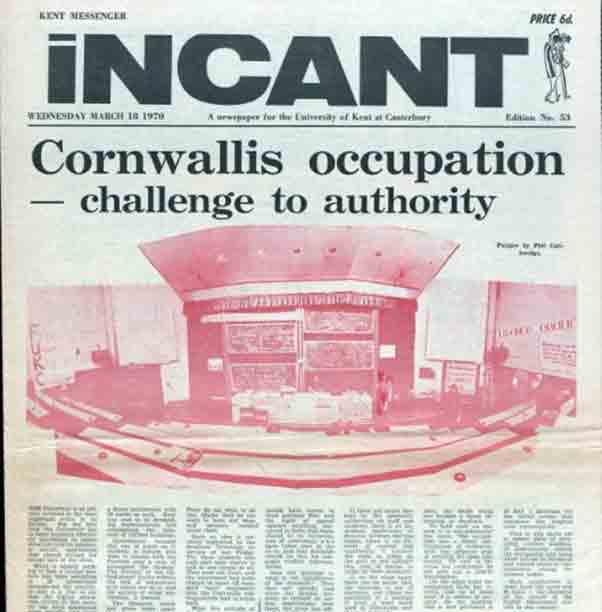
Our landlord and landlady were postgrad students. Nerdy and old fashioned. They provided a minimal breakfast and cocoa and a biscuit at about 9 or 9.30pm when they liked us back and tucked into our shared room. Not even remotely akin to my idea of wild university days! This suited Martin much more than me…but we had to co-exist…we decided that for vaguely harmonious relations we needed to find a shared interest. It was music. We had both bought a stack of vinyl albums with us and our room had a reasonable quality radiogram. Each night we each chose at least one side of an album to play, taking turns to play our favourites. We both pushed and provoked, testing the other person – Martin with classical music, me with the likes of the Doors and the Incredible String Band…it was funny, annoying, a bit childish, but we actually cemented a friendship over a shared love of the Beatles.
Martin adds: “Our landlord and landlady were recently married chemistry graduates. He was a small man and she was a hefty blonde. He was studying for a masters in chemistry whilst she was studying for a PhD. I do remember their joint bath-night sessions when we kept a low profile in our room, noting with some amusement the squeals coming from the bathroom!”
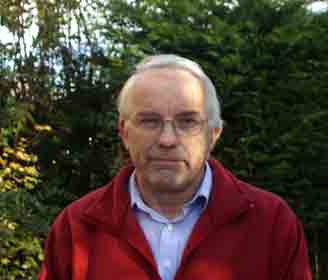
Fifty years on…Martin and myself keep in touch…We’ve lived very different lives, but both us have ‘lived lives’ and some. Martin recently told me a bit about his work-life: “After UKC, I found it was obvious that without a post-grad degree, I was going nowhere in industry so I went to University of Sussex, initially to do a masters (I would have something to show for the year if the money ran out) and this led to a DPhil in organometallic chemistry. It was a wonderful time, working with FRSs and chemistry Nobel Laureates. As an aside, my supervisor, now no longer with us, was on the last kinder transport train out of Prague in 1938.) Then a career in the generic pharmaceutical industry, with the last work being as a co-inspector with the WHO.”
Now you can hear about his current experiences having recently re-located to the Republic of Ireland…Read on…”
Covid times in the Republic of Ireland
Martin Slade
For various reasons, we decided to move to Republic of Ireland. Top of the list was that our grandson is Irish by birth and has started his second year at school. We want to see him grow up. Our youngest son had moved to Thailand to teach English and our eldest son is likely to move with his fiancé to her native Australia. Our immediate links to the UK are becoming weaker.
We finally moved to Ireland last December to temporary accommodation, rented to us by a friend. It is north of Galway, close to Loch Corrib (which is the eastern edge of Connemara) and the town of Headford, just in County Mayo. This house is centred around a 250 year-old thatched cottage with a large extension, located on an acre plot in a rural area. We have always chosen rural rather than urban living and this suited us.
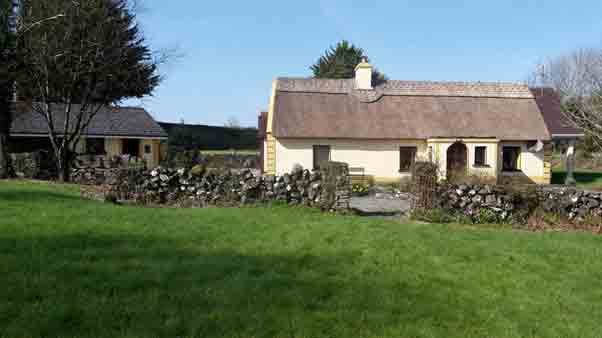
A friend, who loves driving, drove a van for us with valuable items and freezers, last November and we took a car to leave in the garage. The main move was early in last December, with most of our possessions going into a self-store in Limerick with some going to a big garage owned by the mother of a friend of our daughter’s in a small town in County Clare, near Ennis. The removers treated our goods very badly and we still have an on-going argument with the insurance company. It seems as though the removers changed the terms and conditions after we had paid! Unfortunately, this seems typical of the UK. I’ve noticed that over the years the social etiquette of respect and consideration for others, personal integrity etc. has now gone and the attitude is now, “…me, me, me, me” and “stuff you Jack!” I suppose that the obvious examples of this can be found in Westminster and Downing Street.
The attitude in the west of Ireland is much more to our liking and how the UK used to be when we were growing up. The concept of time is a bit elastic but attitude of people is much more civilised.
We were settling in for the winter in Headford and managed to get a reasonable internet connection. As events began to develop, this proved to be invaluable. We met the local farmers, who were very kind and helpful, and started to look into how we registered for the various formalities in Ireland. The key is to apply for, and be assigned, a PPS number, the equivalent of the UK’s National Insurance number. Without the PPS numbers, nothing happens. Time was spent contacting estate agents, looking at the various websites to find a house or bungalow much closer to where our daughter and grandson live, which is in Shannon. After looking at several properties, in February we found the house near Ennis that we eventually bought, (finally moving in June). Even though it is a rural area in the west of Ireland, we have been able to be connected to the internet with a fibre-optic connection direct to the house. When I last checked with the laptop connected directly to the router, we were getting 450Mbps download.
The world was turned upside down around February/March when the Covid 19 pandemic started. Since I have a long-standing lung condition, we had to self-isolate. This was no problem since we were in a remote area and could go for walks etc. and rarely see anyone. When we did, the required separation distance was followed. (To this day, we have not heard of anyone who has contracted the virus in the local area – fortunately.) A friend of ours with a family, has a son who is a junior hospital doctor. For a while, he was in the front-line at Galway hospital working with Covid 19, and it was a worrying time for him. He is now undertaking other duties and so away from direct contact with Covid.
When we were in the house near Headford, we found that the local supermarket would deliver groceries. We would send an email in the morning, someone from the supermarket would phone around the middle of the day to discuss the final order, we would make payment by card and delivery would be later that day. Compared with some people, we were fortunate and had it easy.
Just by chance, I have been interested in viruses for a long time and the lock-down gave me a chance to find a book on-line and start to learn the elementary aspects of viruses. Also, I found a colossal amount of work being published. However, using Google was useless, but Google Scholar gave access to the original papers. Covid 19 is known as SARS COV 2 and is very similar to SARS (SARS COV 1), MERS, ‘flu and cold viruses. A lot of work was being undertaken to examine the treatments for SARS COV 1 and MERS. There are papers, some published at the start of the pandemic, on face masks and studies on how respiration droplets can be spread. Also, a recent paper reports that SARS COV 2 can survive on some surfaces, such as stainless steel, some plastics, for up to 28 days at 20 degrees centigrade. Therefore, we think it is obvious that the way to curtail the spread of SARS COV 2 is for everyone outside to wear face masks and pay rigorous attention to hygiene. There are ways to treat the air in indoor spaces.
However, the general media appear not to be bothered/interested in this work. There seems to be a school of thought that the requirement to wear masks is an infringement of civil liberties and only part of the long-term plan for the control of the population. I prefer the explanation that it is an effective way of controlling the spread of the virus, and displays concern and respect for others. Since the effect of this virus can range from being asymptomatic to death, utmost care is needed. I never bother with ‘social media’ and so have limited exposure to fake news. (Anecdotally, reports are that the content of social media range from drivel to on-line bullying which is so bad that some teenagers are driven to suicide.)
The number of science programmes on TV and radio is virtually nil. The way science is now ignored is disappointing. For example, a co-winner of the 2020 Nobel Prize for Physics is a British astronomer and there are two ladies who are joint 2020 Nobel Prize winners for Chemistry. The way that women have been ignored is a disgrace (e.g. Prof. Jocelyn Bell Burnell) but there were no reports of celebrations etc. for joint female winners. (Anyway, that’s one rant over!)
As I write this, there are concerns in the Republic about a surge of cases, particularly in Dublin and County Donegal. The latter is believed to be due to the close location to two hotspots in Northern Ireland, Derry/Londonderry and Strabane, on the eastern bank of the River Foyle. We are now in a lockdown with a maximum allowable travel distance from home of 5km.
Restrictions in the Republic of Ireland will last until December 1 2020.
Under the restrictions:
- Pubs, restaurants and cafes will only provide takeaways and deliveries.
- Public will be asked to work from home, except for essential workers.
- People will have to restrict movement to 5km of their homes.
- No social or family gatherings in homes or gardens.
- Non-essential retail, hairdressers, barbers and salons will close.
- Funerals will be limited to 10 people.
- Weddings will be limited to 25 people.
- Schools and creches will remain open.
- Elite level sports can continue.
- Construction will be allowed to continue.
We moved in June, knowing that the new house, albeit high spec., had been neglected and, in some instances, not completed, but we are getting on top of the jobs. One issue is that we are close to The Burren, a unique landscape, and the limestone bedrock is very close to the surface on which the house is built. We are working on getting some raised beds constructed so that we can grow some fruit and vegetables. However, work is slow. In the west of Ireland, the pace of life is very laid-back and the concept of time somewhat elastic.
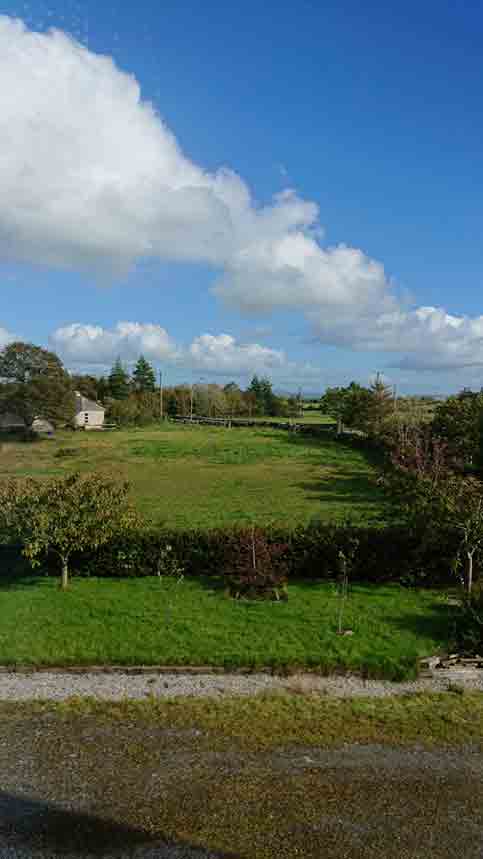
Photo: The view from the new house looking east. In the far distance, you can just make out some hills which are on the west bank of Loch Derg, a big lake which is part of the river Shannon.
In the middle of May, I was unwell and it was found that I had a low pulse rate. I was admitted to the cardiac department of Limerick hospital and received absolutely magnificent treatment which ended up with having a pacemaker/ICD implant. Not an event on the schedule, but it explained why I felt ill and am much better now. I was wired up to various machines and had cannulas installed for different procedures. Following the suggestions on medication from the US President Trump, there was much amusement, debating which cannula would be used for disinfectant and which for the bleach…
Major jobs to get done when we moved included registering with a GP, transferring car registration and driving licences. All these have been completed successfully. After the end of this year, UK driving licences will not be valid in the Republic of Ireland. It has to be seen what will happen at the border between Northern Ireland and the Republic. Covid restrictions and different regulations either side of the border make that more complex. Although we personally have not crossed the border, it appears that the only indication is a notice regarding speed limits; km/hr in the Republic, mph in Northern Ireland. The vast majority of the population on both sides will not tolerate a hard border, so we will have to see what happens.
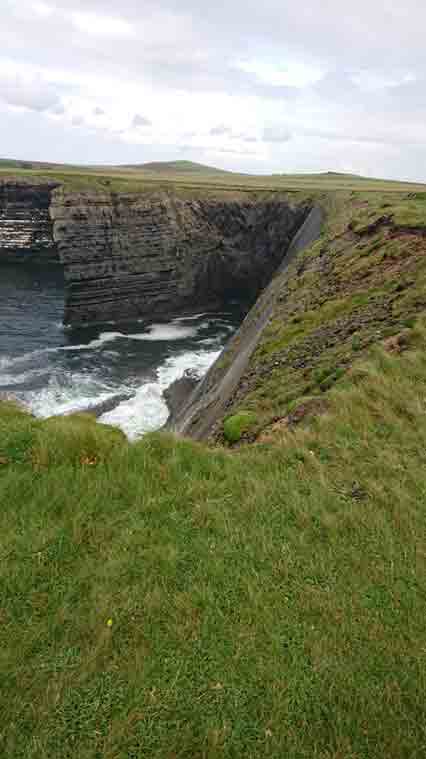
Photo: Loop Head, the most south-westerly part of Co Clare on the north of the Shannon estuary. This is just a bit south of the Cliffs of Moher.
